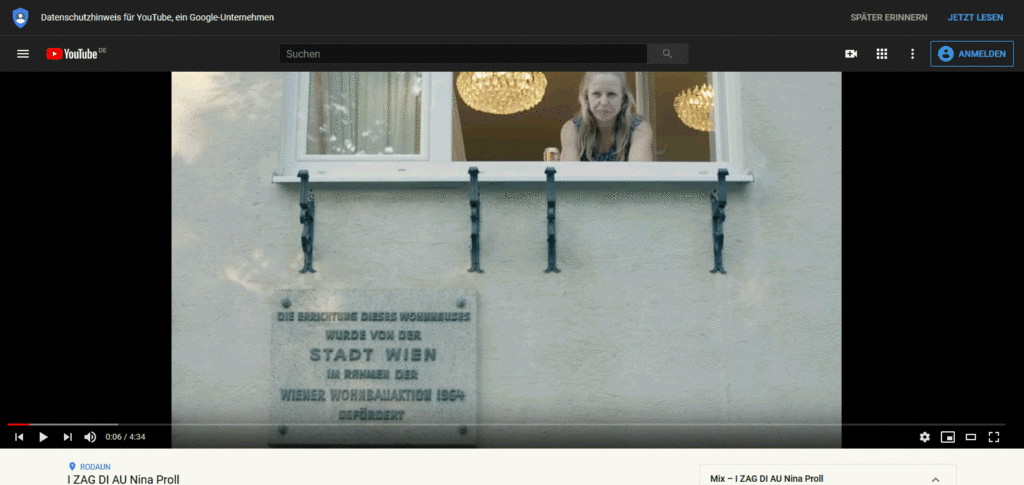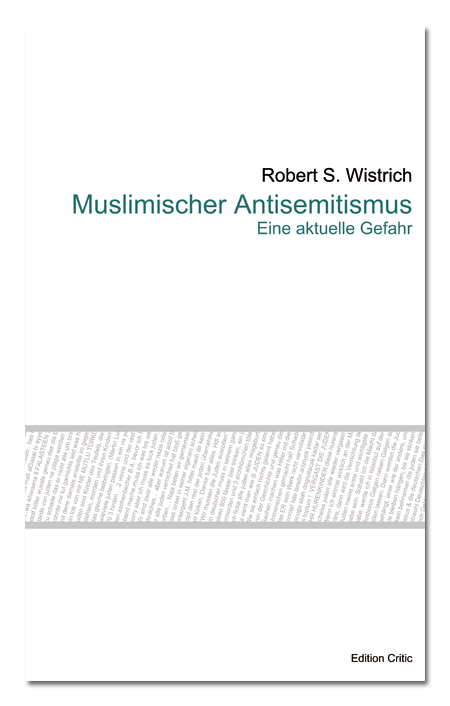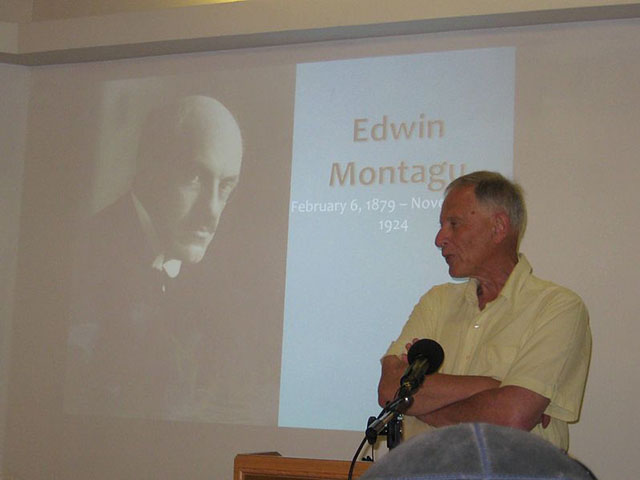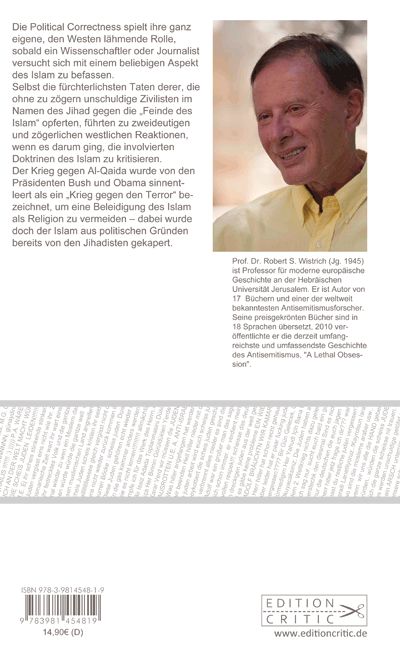Von Dr. phil. Clemens Heni, 25. August 2020
Der Band „Digitalisierung? Grundeinkommen!“, herausgegeben von Werner Rätz, Dagmar Paternoga, Jörg Reiners und Gernot Reipen im Wiener Verlag Mandelbaum und dessen Reihe „kritik & utopie“ plädiert für ein bedingungsloses Grundeinkommen (BGE).
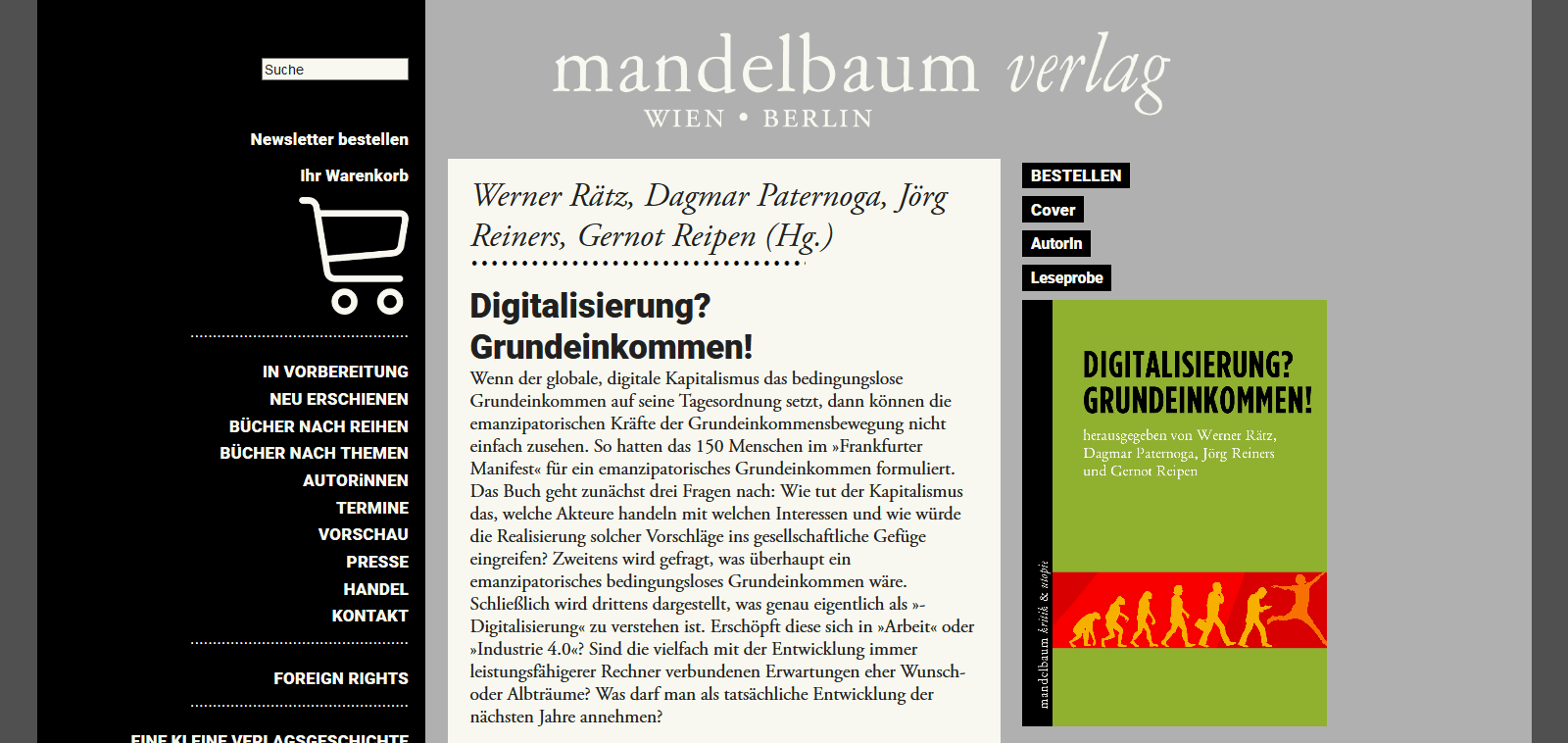
Screensthot, https://www.mandelbaum.at/buch.php?id=888
Seit Jahrzehnten ist das Grundeinkommen Thema der Sozialpolitik. Der Sozialwissenschaftler Michael Opielka forscht und publiziert seit den 1990er Jahren zu diesem Thema, ohne Teil des Bandes zu sein. Eine hilfreiche Übersicht über die Geschichte der Idee eines Grundeinkommens bietet das (immer kritisch zu lesende und nie unhinterfragt zu rezipierende) Online-Lexikon Wikipedia.
Grundsätzliche Fragen wie die Finanzierung des bedingungslosen Grundeinkommens werden in dem Band nicht dargestellt, es geht in dem abgedruckten „Frankfurter Manifest – Digitalisierung? Grundeinkommen. Möglichkeiten einer emanzipatorischen Gestaltung“ und den 13 Beiträgen von 19 Autor*innen (im Westentaschenformat, ca. 12×17 cm, 200 Seiten) eher um eine linke Selbstfindung. Die Autor*innen sind entweder Funktionär*innen bei der Linkspartei, Bündnis 90/Die Grünen, Piratenpartei, SPD oder aktiv bei NGOs wie Attac sowie freischaffende Publizist*innen.
Für Einsteiger*innen in das Thema ist das Buch nicht geeignet, da es z.B. keine Darstellung bietet, wie ein solches Grundeinkommen finanziert werden könnte, von Bemerkungen über eine Finanztransaktionssteuer oder ein paar Schaubildchen mal abgesehen. Die Konzepte sind in der Tat sehr kompliziert, aber so ganz ohne ökonomische Begründung wirkt das alles etwas vage. Wer also erfahren will, wie das BGE funktionieren könnte, findet in dem Band kaum Antworten. Es geht vielmehr darum, warum die Linken das Thema bislang links liegen ließen, was auch eine sehr wichtige Fragestellung ist.
Interessant ist die Kritik an der Unterstützung eines BGE durch das Silicon Valley in Kalifornien bzw. durch Protagonist*innen des digitalen oder turboneoliberalen Kapitalismus:
Im Zuge des ‚neuen Geistes des Kapitalismus‘ werden lebenslanges Lernen, die unternehmerische Validierung der eigenen Biografie und das Managen des Selbst zur daily operation. Das Projekt löst die Fabrik ab, der Selbstunternehmer löst den Angestellten ab und macht die Weiterentwicklung und Verbesserung der eigenen employability zur Chefsache. (S. 71)
Reine Geldleistungen wie 1000 oder 1500€ monatliches bedingungsloses Grundeinkommen werden durchaus kritisch gesehen und betont, dass die „Forderungen nach einem direktem Zugang zu Daseinsvorsorge“ zentral ist:
Bildung, Gesundheitsversorgung, Mobilität, Kommunikation, Grundversorgung mit Energie und Wohnen sollten öffentlich finanziert und kostenlos sein. (S. 77)
Das sind sinnvolle und eminent wichtige Forderungen, die ein rein Kapitalismus immanentes BGE in Frage stellen, das nur via Geldtransfer auskäme. Gleichwohl wäre schon ein solches BGE ein Fortschritt für viele Millionen Freischaffende, prekär Beschäftigte, Teilzeitangestellte, Soloselbständige und viele mehr.
Es gibt keine Tradition der Idee des Grundeinkommens, wie im Rekurs auf Karl Reitter, der dazu in der gleichen Buchreihe zum Thema publiziert hat, betont wird. (S. 81) So ist auch die massive Ablehnung eines BGE durch fast alle Gewerkschaften und typische ‚altlinke‘ Forscher wie Christoph Butterwegge (S. 193) bezeichnend.
Die Autor*innen gehen also einen sympathischen, eher undogmatischen Weg und kritisieren sowohl kapitalistische Versuche mit Digitalisierung und BGE die bürgerliche Gesellschaft zu transformieren, um sie zu erhalten, also auch die Besitzstandswahrung der Gewerkschaften und der linken Parteien und deren Klientel, das sich weitgehend gegen ein BGE ausspricht. Das Buch möchte ein antikapitalistisches BGE.
Digitalisierung wird jedoch primär positiv betrachtet und als Vorschein des Marxschen „Reichs der Freiheit“, was nun wirklich indiziert, dass technikkritische Debatten seit der Dialektik der Aufklärung von Horkheimer und Adorno von 1947 oder Günther Anders‘ Antiquiertheit des Menschen (Band 1 von 1956) sowie die Fallstricke einer Arbeitsontologie oder Technikaffirmation bei Marx wie beim Marxismus fast komplett ignoriert werden.
Auch eine grundsätzliche „Netz“-Kritik oder des binären Codes von 0 und 1, der nicht erst durch die kapitalistische Vermarktung problematisch wird, ist nicht ansatzweise in dem Band zu finden. Einzig der Beitrag zu Gesundheit und BGE ist da etwas skeptischer und kritisiert in Anlehnung an Foucault ein „Digitales Panoptikum“ (S. 158). Insbesondere die heute so dramatisch aktuelle Situation, „dass Krankheit als Schuld der Erkrankten gesehen und ihr damit die Verantwortung zugschrieben wird“, ist hellsichtig (S. 159).
Doch es ist zu bezweifeln ob die Autorin, eine Attac-Aktivistin, das auf die Corona-Zeit überträgt und nicht vielmehr wie Attac und fast alle anderen Linken den neoliberalen Zuschnitt des Gesundheitssystems anprangert (das zeigt sich z.B. in einem Gespräch über Corona mit der Co-Herausgeberin des Bandes, Dagmar Paternoga, die Anfang April 2020 von der Journalistin Milena Preradovic interviewt wurde), aber gar nicht sieht, wie irrational die ganze Krise ist, wenn man sich medizinisch, epidemiologisch und gesellschaftstheoretisch mit dieser nie dagewesenen Panikindustrie oder dem „Hygienismus“ und der Gefahr einer „Gesundheitsdiktatur“ (so der Philosoph Markus Gabriel) mit Corona befasst.
Das zeigte sich ja exemplarisch am aggressiven Sich-Verschleiern durch die Parteivorsitzende der Partei „Die Linke“, Katja Kipping, die mit Maske im Bundestag auftrat. Sie hat auch einen Beitrag in dem Band, der relativ nichtssagend ist und reines Parteigeplänkel, aber den doch bezeichnenden Satz ans Ende stellt: „Dass ‚Mehr Demokratie wagen‘ alternativlos ist, liegt auf der Hand.“ (S. 173)
Nichts ist „alternativlos“, auch wenn das offenkundig wenig demokratiegeschulte und für autoritäre Maßnahmen offene Politiker*innen wie Angela Merkel oder Katja Kipping (und aktuell fast das komplette politische Establishment) propagieren. Das Wort „alternativlos“ ist eine reine Zumutung, doch der Verlag druckt es und es mag für die Ideologie der Linkspartei stehen, die Merkel und die CDU/CSU/SPD von links sekundiert.
Angesichts der Coronamassenpanik zeigt sich, wie wichtig ein BGE wäre. Andererseits zeigt sich auch angesichts dieser Krise, wie böse die Menschen durchaus sind, wie denunziatorisch sie wieder agieren und Leute anzeigen, die sich dem „Hygienismus“ oder irrationalen Maßnahmen nicht fügen. Die österreichische Schauspielerin Nina Proll hat das in einem kritischen Song zum wütenden Ausdruck gebracht („I ZAG DI AU“).
Die Digitalisierung wird entscheidend sein für autoritäre Regime der Zukunft, ob nun chinesischen oder technisch-kapitalistischen, westlich-post-demokratischen Zuschnitts. Das klingt in einigen Beiträgen durchaus an – wie am Beispiel von „Fitness-Apps“ (S. 157), das sich wie eine böse Vorahnung der Corona-App liest –, aber immer nur in Bezug auf den Kapitalismus, nie im Sinne der kritischen Technikforschung der Digitalisierung wird Technik als Phänomen sui generis, als Indiz der Antiquiertheit des Menschen analysiert, wie es eine „Digitalisierung der Lebenswelt“ in Anschluss an Edmund Husserl (einem Lehrer von Anders) nahelegen könnte.
Es kann auch nicht kapitalistische oder dezidiert linke Technokrat*innen geben, die mit der modernsten Technik das Leben der Menschen aushorchen, manipulieren oder bestimmen wollen (denken wir an die Geschichte im 20. Jahrhundert). Die Kritik des Transhumanismus, der ja Mode ist und von Milliardären und technokratischen Zukunftsplanern wie Elon Musk als faszinierend empfunden zu werden scheint, kommt in den Band jedoch immer nur als Problem des Kapitalismus vor, nie als technischer Imperativ jenseits polit-ökonomischer Systematik.
Fazit
Das bedingungslose Grundeinkommen wäre für Millionen Menschen sehr wichtig, es würde ungemein viele soziale Abhängigkeiten beenden, würde viel mehr Kreativität freisetzen.
Es würden alle Menschen davon Nutzen ziehen, da nie mehr die Gefahr im Raume stünde, sich das Leben nicht leisten zu können. Demütigende Gänge zum Sozialamt oder Job Center etc. würden ersatzlos gestrichen, schon das würde die Gesellschaft womöglich extrem positiv verändern.
Genau davor haben SPD, die Gewerkschaften und natürlich weite Teile des Bürgertums Angst, wenn die Menschen keine Panik mehr haben, gedemütigt zu werden, würden sie dann weiter arbeiten wollen?
Das wäre eine philosophische Frage nach Hannah Arendts „Vita activa“, nach einem Kern des Mensch-Seins. Wie wir jetzt erleben, sind Wissenschaft, Kultur, Geistes- und Sozialwissenschaften „nicht systemrelevant“, so die Herrschenden im Mainstream.
Das würde sich ändern, wenn es ein BGE gäbe, auch wenn das antidemokratische Maßnahmen wie das willkürliche Schließen von Universitäten – während Baumärkte offen haben – nicht betreffen würde, aber die Menschen hätten ein Auskommen, auch wenn sie de facto vom Staat Berufsverbot bekommen haben und für einen bezahlten Artikel nicht in der Bibliothek forschen können, weil diese geschlossen hat.
Das Jahr 2020 und die Coronakrise zeigen also wie relevant ein BGE wäre, doch es zeigt sich noch viel stärker, dass das demokratische Bewusstsein der Menschen von heute auf morgen in sich zusammenbrechen kann und nur noch – von kritischen Jurist*innen oder dem Wissenschaftlichen Dienst des Deutschen Bundestags aktuell als verfassungsfeindlich vermutete – Maßnahmen befolgt werden, ja der Staat und die Bevölkerung sich geradezu gegenseitig aufpeitschen, gegen Kritiker*innen vorzugehen. Ein BGE ohne Grundrechte wäre absurd, deshalb wird man allein bei der Person Katja Kipping sehr skeptisch.
Das womöglich etwas naive und in Hinsicht Technikeuphorie traditionslinke Weltbild der Autor*innen von „Digitalisierung? Grundeinkommen!“ – entgegen der so wichtigen neuen Perspektive auf das bedingungslose Grundeinkommen, das fast die gesamte linke Arbeiterbewegungstradition in Frage stellt – stellt diese Fragen nicht wirklich, ein Fortschrittsoptimismus vernebelt hier doch vieles.
Es wäre eine entscheidende Frage, ob Vertreter*innen des bedingungslosen Grundeinkommens sich kritisch zur aktuellen Coronamassenpanik stellen oder doch eher mitmachen und immer nur die nicht falschen, aber längst nicht ausreichenden Fragen nach dem kapitalistischen Gesundheitssystem stellen. Wenn Antikapitalist*innen teils noch viel vehementer die Überwachung und Reglementierung der Menschen angesichts von Corona einfordern, und zugleich ein BGE verlangen, führte das nicht zu exzessiver staatlicher Herrschaft im rosa Gewand der Gemeinnützigkeit?
Wenn wir abschließend dann auch noch sehen, dass der Mandelbaum Verlag aktuell Bücher publiziert, die doch schon aufgrund der Ankündigung eher zur Verharmlosung oder Unterstützung des aktuellen linken Antisemitismus wie auch der BDS-Bewegung dienlich sein können, wird man beim Verlagsprogramm sehr skeptisch.
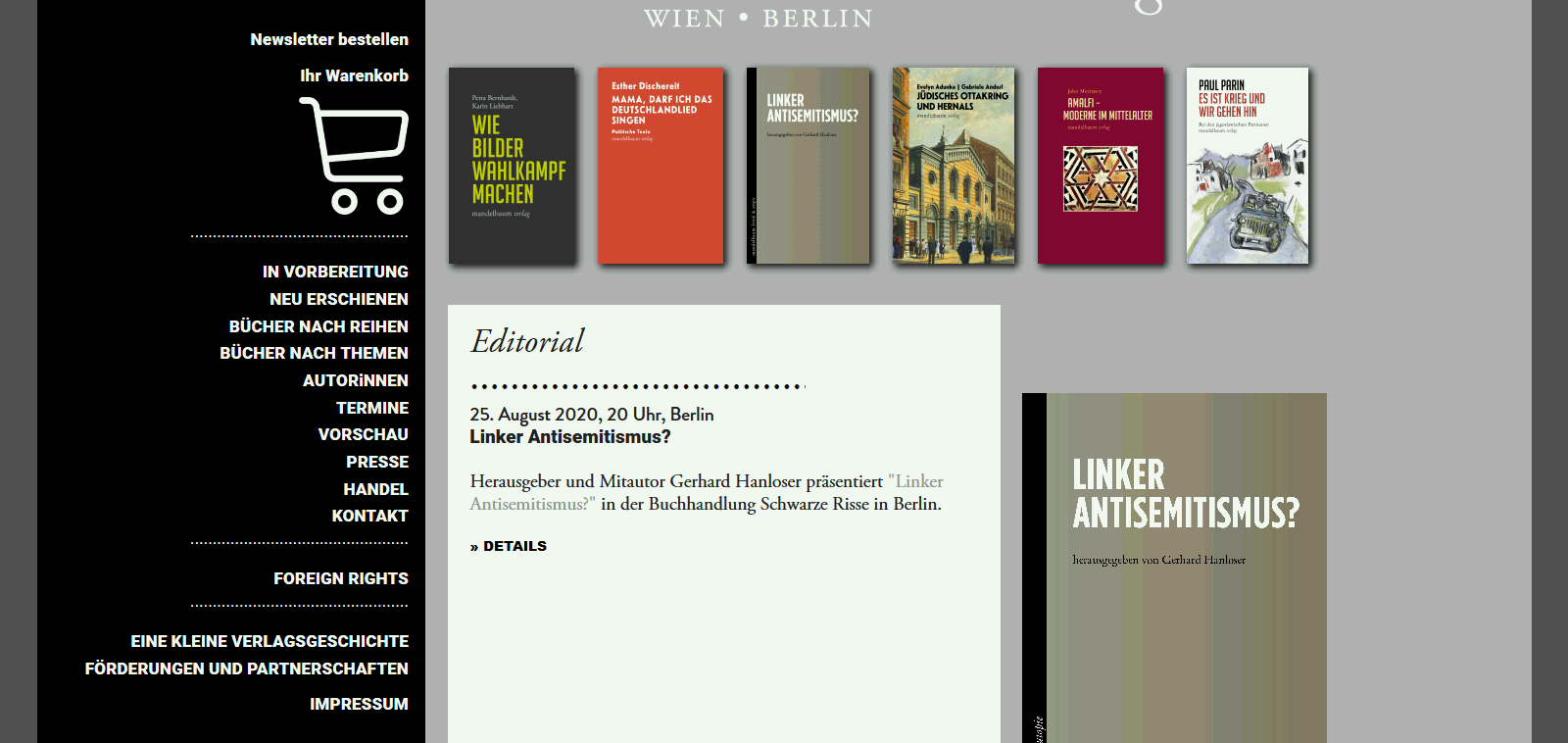
Screenshot, https://www.mandelbaum.at/
Literatur:
Anders, Günther (1956): Die Antiquiertheit des Menschen. Über die Seele im Zeitalter der zweiten industriellen Revolution, München: C.H. Beck
Anders, Günther (1980): Die Antiquiertheit des Menschen. Über die Zerstörung des Lebens im Zeitalter der dritten industriellen Revolution, München: C.H. Beck
Arendt, Hannah (1960): Vita activa oder vom tätigen Leben, Stuttgart: Kohlhammer
Gabriel, Markus (2020): Der Hygienismus kann in eine Gesundheitsdiktatur umschlagen, Die Welt, 22.04.2020
Horkheimer, Max/Adorno, Theodor W. (1947): Dialektik der Aufklärung. Philosophische Fragmente. Friedrich Pollock zum 50. Geburtstag, Amsterdam: Querido
Langenbach, Jürgen (1982): Selbstzerstörung. Zur Identität von abstrakter Arbeit (Technik) und Faschismus, München: Raben Verlag
Mirbach, Thomas (2020): Digitalisierung der Lebenswelt. Studien zur Krisis nach Husserl, 20. Juli, https://www.pw-portal.de/leben-und-arbeiten-in-der-digitalen-welt/40960-digitalisierung-der-lebenswelt-studien-zur-krisis-nach-husserl
Opielka, Michael (2019): Das Glas ist mindestens halbvoll, 11.07., https://www.grundeinkommen.de/11/07/2019/michael-opielka-das-glas-ist-mindestens-halbvoll.html
https://de.wikipedia.org/wiki/Bedingungsloses_Grundeinkommen
Wissenschaftlicher Dienst (2020): Staatsorganisation und § 5 Infektionsschutzgesetz. WD 3-3000 -080/20, 02. April 2020, https://www.bundestag.de/resource/blob/690262/cb718005e6d37ecce82c99191efbec49/WD-3-080-20-pdf-data.pdf

